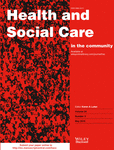Development and psychometric evaluation of a new team effectiveness scale for all types of community adult mental health teams: a mixed-methods approach
Abstract
Defining ‘effectiveness’ in the context of community mental health teams (CMHTs) has become increasingly difficult under the current pattern of provision required in National Health Service mental health services in England. The aim of this study was to establish the characteristics of multi-professional team working effectiveness in adult CMHTs to develop a new measure of CMHT effectiveness. The study was conducted between May and November 2010 and comprised two stages. Stage 1 used a formative evaluative approach based on the Productivity Measurement and Enhancement System to develop the scale with multiple stakeholder groups over a series of qualitative workshops held in various locations across England. Stage 2 analysed responses from a cross-sectional survey of 1500 members in 135 CMHTs from 11 Mental Health Trusts in England to determine the scale's psychometric properties. Based on an analysis of its structural validity and reliability, the resultant 20-item scale demonstrated good psychometric properties and captured one overall latent factor of CMHT effectiveness comprising seven dimensions: improved service user well-being, creative problem-solving, continuous care, inter-team working, respect between professionals, engagement with carers and therapeutic relationships with service users. The scale will be of significant value to CMHTs and healthcare commissioners both nationally and internationally for monitoring, evaluating and improving team functioning in practice.




